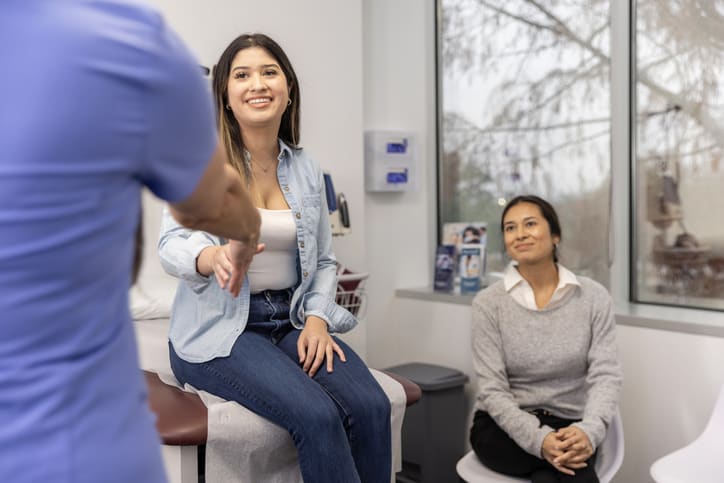
[5 min read]
- At every stage of life, there are important topics to cover with your gynecologist.
- You should consider taking your child for their initial gynecologist visit when they are between the ages of 13 and 15.
- Some concerns, like sexually transmitted diseases and cancer, are important topics to cover with your GYN throughout life.
- A Providence Swedish expert has guidance to help patients of every age get the most out of their gynecologist visits.
Providence Swedish offers extensive services for every phase of a woman’s life, whether that’s menopause care at our Women’s Specialty Wellness clinic or cutting-edge care at the Providence Swedish Cancer Institute. Our caregivers are committed to providing every woman who comes to us with the best, most innovative and sometimes lifesaving care.
Regular visits with an OB/GYN are vital to maintaining optimal health throughout life and especially for preventive care. GYN care is critical for teen health, though getting started with “the talk” might leave some parents and their kids feeling a little squeamish.
For some advice to help women and girls get the most out of their OB/GYN visits, we talked to Reena Vasavada-Parikh, M.D., a gynecologist at our Swedish Gynecology Specialty Center in First Hill.
When should I consider taking my daughter for her first GYN visit? Can her pediatrician/family doctor do this?
We recommend an initial reproductive visit between ages 13 to 15. This is an opportunity for general education and to provide preventative health services. This can be done with a primary care physician based on their comfort level. It also allows us to screen for potential issues. For example, blood clotting disorders may be diagnosed based on heavy periods at menarche.
What are some tips for making my child’s first GYN visit easier?
For a lot of teens and adolescents, reassurance that we do not perform a pelvic exam unless absolutely necessary is a big one. For the most part, we can diagnose and treat based on history. We can even screen for sexually transmitted disease (STDs) using urine. And if an ultrasound is needed, this can be done abdominally. Cervical cancer screening (with Pap smears) starts at age 21, so those are not necessary for patients in this age group. And some teens might prefer to speak to the provider one-to-one, and it helps if the parent is aware of this prior to the exam.
What are some important questions or issues to discuss at this stage of life?
An important one is human papilloma virus or HPV vaccination, if your child hasn’t already had one, as well as the prevention of STDs and contraception. I also encourage discussion about menstruation and what is or is not normal. Sexuality is a really important topic as are other health issues like stress, diet, nicotine and other lifestyle factors affect gyn health.
Oftentimes, questions that come up during a visit can spark a discussion between teens and parents regarding family health history and how that could impact future health issues. For example, a child may not even know about a family history of diabetes, which could mean that they might be predisposed to polycystic ovary syndrome or PCOS, which would cause irregular periods. It’s important information for them to have, especially for health care decisions later on in life.
What are the important issues for patients in their 20’s and 30s?
Cervical cancer screening with Pap or HPV starts at age 21. Reproductive issues are important including prevention of pregnancy or optimizing health for pregnancy. It is also important to discuss painful or irregular periods, both for treatment and for diagnosing other conditions such as endometriosis, uterine fibroids, PCOS and even uterine cancer (which we are seeing at younger ages.) STD screening is important for this age group, especially as we have seen an increase in syphilis.
I’m in my late 30’s or early 40’s and I am done having kids. What are the most important issues for this age group? Is there anything I should talk about if I haven’t had kids and don’t plan on having them?
What are the primary issues for patients in menopause or who are postmenopausal? Do I still have to go to the GYN if I am postmenopausal?
And what about those in their 50s and beyond. Why is it important to continue regularly scheduled GYN visits for this age group?
Learn more and find a physician or advanced practice clinician (APC)
If you need a gynecologist, women's health specialist or primary care doctor, Swedish is here for you. Whether you require an in-person visit or want to consult a doctor virtually, you have options. Contact Swedish Primary Care to schedule an appointment with a primary care provider. You can also connect virtually with your provider to review your symptoms, provide instruction and follow up as needed. And with Swedish ExpressCare Virtual you can receive treatment in minutes for common conditions such as colds, flu, urinary tract infections, and more. You can use our provider directory to find a specialist or primary care physician near you.
Information for patients and visitors
Additional resources
What is pelvic floor dysfunction and how is it treated?
New Swedish Gynecology Specialty Center brings a host of women’s health services under one roof
You can thrive, not just survive, during perimenopause and menopause
Fibroids 101: A common condition with many treatment options
There's a new treatment for urinary tract infections. What should you know?
This information is not intended as a substitute for professional medical care. Always follow your health care professional’s instructions.
Providence Swedish experts in the media
Follow us on Facebook, Instagram and X.
About the Author
More Content by Swedish Women's Health Team























